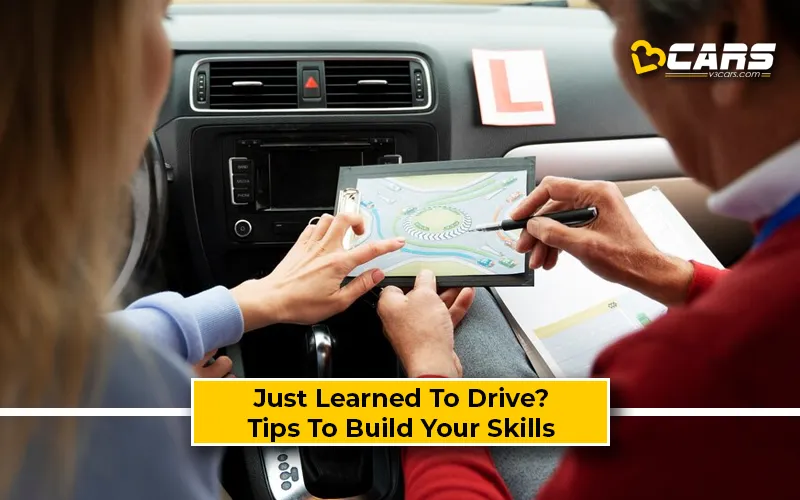Just Learned To Drive? Here Are Useful Tips to Get You Started
Learning to drive marks a significant milestone in life. It grants you newfound freedom, independence, and opens the door to exciting adventures on the open road. Whether you've recently obtained your driver's licence or you're a seasoned driver looking for a refresher, this guide offers a comprehensive set of tips to help you build your driving skills, boost your confidence, and ensure your safety behind the wheel.

Familiarise Yourself With Your Vehicle
Before you venture out on the road, take the time to familiarise yourself with your vehicle. This entails more than just knowing where the ignition key is located. Here's a checklist to get you started:
- Understand the location and function of essential controls: These include the steering wheel, accelerator pedal, brake pedal, clutch (if your vehicle has a manual transmission), gear shift, indicators, headlights, wipers, and emergency flashers.
- Locate and understand the dashboard gauges: Learn to read and interpret your car or SUVs speedometer, fuel gauge, temperature gauge, and other essential indicators.
By becoming one with your vehicle, you'll gain confidence, making your driving experience more enjoyable and less stressful.
Practice, Practice, Practice
Practice is the cornerstone of becoming a confident and skilled driver. You wouldn't expect to become a pro athlete or musician without practice, and the same applies to driving. Start in a controlled environment, such as an empty parking lot, to get a feel for your car's handling. As you gain confidence, venture onto quieter streets, gradually building up to navigating busier roads.
Stay Informed About Traffic Rules
Knowing the rules of the road is essential. Study Indian traffic laws, road signs, and signals. Staying informed about traffic regulations ensures not only your safety but also your ability to make well-informed, legal driving decisions.
Maintain a Safe Following Distance
A fundamental rule of safe driving is to maintain a proper following distance. The commonly recommended 3-second rule is a great guideline: ensure there is at least a 3-second gap between your car and the one in front. In adverse weather or road conditions, increase this following distance to allow for safer stopping.
Avoid Distractions
Distracted driving is a leading cause of accidents on the road. To ensure your safety, put away your phone, avoid fiddling with the radio, and keep your focus solely on driving. If you must use your phone or adjust the radio, pull over to a safe location before doing so.
Stay Calm in Traffic
Traffic jams are an unavoidable part of driving. Instead of letting them stress you out, approach them with patience and a calm demeanour. Maintain a safe following distance and avoid aggressive driving behaviours. Allow other vehicles to merge and practice courtesy on the road.
Use Your Mirrors Effectively
Proper mirror usage is crucial for safe driving. Adjust your side and rearview mirrors to minimise blind spots. Develop a habit of regularly checking your mirrors to stay aware of your surroundings. Understanding what's happening behind, beside, and in front of you is essential for making well-informed decisions.
Also Read: Best EVs Under Rs. 70 Lakh You Can Buy In India
Note: If You Want to Buy a New Car, Calculate Car Loan EMI with V3Cars
Observe Speed Limits
Speed limits exist for a reason: safety. Follow these limits to reduce the risk of accidents and avoid fines. Remember, it's better to arrive at your destination a little later than not at all. Speeding endangers not only your life but the lives of others on the road.
Master Parking Skills
Parking can be a nerve-wracking experience for new drivers. To boost your confidence, practice both parallel and perpendicular parking in an empty lot. Over time, you'll become proficient at manoeuvring into tight parking spaces, making your trips more convenient and less stressful.
Adapt To Weather Conditions
Weather conditions significantly affect road safety. When driving in rain, snow, fog, or other adverse conditions, slow down and exercise additional caution. Ensure your vehicle's lights and windshield wipers are functioning correctly and use them as needed. By adapting to changing weather conditions, you'll minimise your risk of accidents.
Know How to Handle Emergencies
Being prepared for emergencies is part of being a responsible driver. Familiarise yourself with your car's manual to understand how to handle situations like a flat tire or a breakdown. Keep essential emergency equipment, including a spare tire and a toolkit, in your vehicle.
Buckle Up
Safety should always be a top priority. Therefore, make it a habit to buckle up every time you step into your vehicle. Seatbelts are a primary safety feature in your car and can save lives in accidents.
Keep Your Vehicle Maintained
Regular maintenance of your car or SUV is essential for safety and optimal performance. Stay current with tasks like oil changes, tyre rotations, brake checks, and other routine maintenance tasks. A well-maintained car is a safe car.
Stay Sober
Driving under the influence of alcohol or drugs is not only illegal but incredibly dangerous. Alcohol impairs your judgement, coordination, and reaction times. If you've been drinking, always arrange for a designated driver or use alternative transportation methods like a taxi or rideshare service like Ola or Uber.
Use Technology Wisely
Modern vehicles come equipped with advanced safety features and technology. It's essential to learn how to use these features effectively. Features like adaptive cruise control, lane-keeping assist, and emergency braking can enhance your safety and make driving more comfortable.
Be Prepared For Night Driving
Nighttime driving requires different skills. Ensure your headlights, taillights, and indicators are functioning correctly to maximise your visibility. It's also a good practice to drive in the dark, gradually building your confidence and night-driving skills.
Stay Calm In High-Stress Situations
Unexpected events can occur on the road, from aggressive drivers to sudden road deviations. In high-stress situations, it's crucial to stay calm. Avoid road rage and focus on your safety and the safety of other road users. Making rational decisions during stressful moments can prevent accidents.
Learn To Merge And Change Lanes Properly
Merging onto highways and changing lanes can be challenging, even for experienced drivers. Practise these manoeuvres until you're comfortable with them, paying close attention to signalling and checking blind spots.
Learning to drive is a significant milestone in anyone's life. However, it's just the beginning of your journey as a responsible, safe, and confident driver. These tips are designed to help you develop essential driving skills, build your confidence, and ensure your safety on the road. Remember that becoming a skilled driver is an ongoing process. Stay safe, stay informed, and enjoy the open road responsibly.
Also Read: How To Negotiate With Car Dealers Like A Pro
Note: Calculate Car Fuel Cost with V3Cars for India and Other Countries


0 Comments